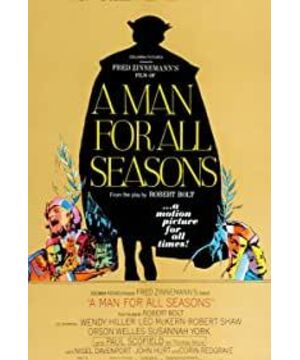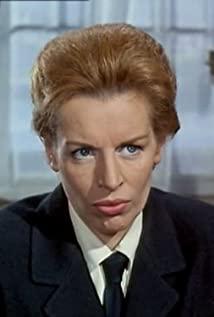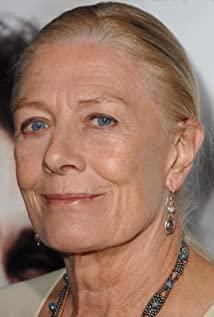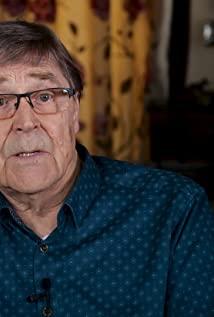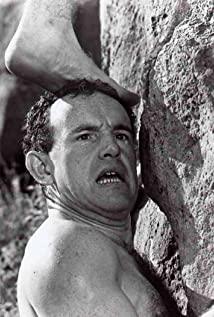An important lesson about going to the stake for one's indomitable faith, Fred Zinnemann's Oscar champ A MAN FOR ALL SEASONS makes for an illuminating viewing, preponderantly predicated on Paul Scofield's Oscar-winning performance of Sir Thomas More (1478-1535), an English lawyer , statesman and author (noted for his chef d'oeuvre UTOPIA), who opposed King Henry VIII's separation from the Catholic Church, refused to take an oath of acknowledging the king as Supreme Head of the Church of England, and the annulment of his marriage to Catherine of Aragon, ended up being executed for high treason.
One's mileage may vary versus monarchal idiocy and cruelty, but Robert Bolt's script (adapted from his own triumphant play) comes off as over-lofty by monomaniacally fixating on one through-line, viz. various personages, from King Henry himself (Shaw), his superior Cardinal Wolsey (Welles), his peers, the Duke of Norfolk (Davenport) his friend and Thomas Cromwell (McKern) his foe, to his closest kin, wife Alice (Hiller) and daughter Margaret (York), indefatigably try to persuade , wheedle, command or browbeat him into change his mind, ultimately for his own life's sake. However, More is far too obstinate on his way to his martyrdom, and the narrative hardly sheds any lights on his supposed inner struggle and oscillation, what transpires mostly is a virtuous More flouts any futile coercion with rapier-like counterexamples and repartee.
That said, one thing is for sure, Scofield's grand poise and sterling elocution can be indubitably ranked as the apotheosis of any thespian rendition, his lilting vocal register and a deeply affecting earnestness is pure magick to witness, and when it is time for him to grandstand, what content he utters does not seem matter anymore, he is a thespian who is endowed with a show-stopping charisma that few can match, period.
The rest of the cast is per usual (as in a British period drama), runs from cracking scene-stealers to serious luvvies (sorry, McKern and Davenport, both have ample chances to be less forceful and more mutable, which both dispense with bluster ), Wendy Hiller arguably has only one shining moment in her last scene, and she proves that she is an equal force of Scofield in her intensity and pathos, which gifts her another Oscar nomination. Robert Shaw's highfalutin impression of the notoriously mercurial Henry VIII is also a delight (which garnered his only Oscar nomination), partially thanks to that he only appears in two occurrences-the lengthy exchange with More and a rather austere wedding celebration, with Vanessa Redgrave in a wordless cameo as Ann Boleyn,wordless but stunning nonetheless-because one might have doubt how to endure him in a lengthy run (please check Charles Jarrott's less pungent ANNE OF THE THOUSAND DAYS, 1969, which appears to share some of the settings), also Orson Welles makes a splash in his startlingly corpulent proportions and a profound gaze that can shatter through one's soul. But as this reviewer sees it, a young John Hurt also gives a vivid performance as the treacherous, prestige-seeking Richard Rich, telegraphs a palpable trace of subtlety that encompasses consternation , humiliation, vengeance and a moral vacillation that feels wanting in other key characters.also Orson Welles makes a splash in his startlingly corpulent proportions and a profound gaze that can shatter through one's soul. But as this reviewer sees it, a young John Hurt also gives a vivid performance as the treacherous, prestige-seeking Richard Rich, telegraphs a palpable trace of subtlety that encompasses consternation, humiliation, vengeance and a moral vacillation that feels wanting in other key characters.also Orson Welles makes a splash in his startlingly corpulent proportions and a profound gaze that can shatter through one's soul. But as this reviewer sees it, a young John Hurt also gives a vivid performance as the treacherous, prestige-seeking Richard Rich, telegraphs a palpable trace of subtlety that encompasses consternation, humiliation, vengeance and a moral vacillation that feels wanting in other key characters.
Not a worthy Oscar champ to this reviewer's liking, Zinnemann's A MAN FOR ALL SEASONS is a sign of its times, high on royal prestige, noble legalism and religious adherence, low on human complexity, humility and nuance that seem to only prevail in an utopian version of our world.
referential entries: Zinnemann's HIGH NOON (1952, 8.0/10), Charles Jarrott's ANNE OF THE THOUSAND DAYS (1969, 6.8/10).
View more about A Man for All Seasons reviews


